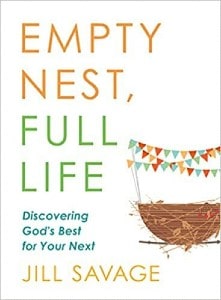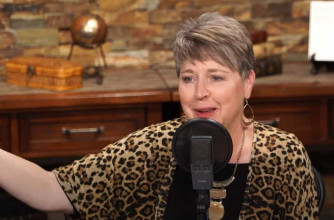Preview:
Jill Savage: Mark and I call ourselves Mark and Jill 2.0. okay? Mark and Jill 1.0, uh, was, uh, when we were raising our family. But Mark and Jill 2.0 is in this new season of life, we’re identifying the possibilities of the empty nest together. Uh, often times people have been waiting for the kids to leave so long that they’ve forgotten that maybe it actually could be different. It might take some work to make it different. Because without a doubt, you probably have gotten into some bad habits, you’ve stopped communicating about, you know, you, your … You’re not communicating about feelings and dreams anymore. And it’s time to do that.
End of Preview
John Fuller: Jill Savage joins us today on Focus on the Family. Your host is Focus President and author, Jim Daly. And I’m John Fuller.
Jim Daly: John, uh, some of your children have grown up and kind of-
John: They have-
Jim: … flown the coop.
John: … they have left the nest and come to the-
Jim: The, uh-
John: … nest. They’ve left-
Jim: Wh- eh, what’s that-
John: … the nest-
Jim: … feeling like?
John: … and … Well, we’ve actually had some nights with no children in the home. And it’s, it’s a pretty-
Jim: (laughs).
John: … it’s a pretty cool feeling. We’re not sure what to do with it yet. But we’re-
Jim: Is it boring?
John: … looking forward … No.
Jim: (laughs).
John: No. Not yet.
Jim: Oh, okay. Well-
John: We’re looking forward to it.
Jim: … Jean and I, we have one out and-
John: Yeah.
Jim: … one to go.
John: Almost there.
Jim: And we’re almost there. I’m sure we’re gonna have some of that ebb and flow like most parents feel. But I’m looking forward to it. I was just having dinner with the one that moved out, Trent, the other night. And it had, it had been a few days since we had connected. I just told him, I said, “Do you, do you mind if I call you? Uh, ’cause I’m missing you.” And he goes, “Absolutely not.” I said, “Can we just make a little agreement that we’ll try to talk once a week together for the rest of our lives?” He said, “Yeah. I’d love that, dad.” I said, “Okay. I just wanna make sure, ’cause I just don’t wanna go too long without-”
John: Mm-hmm.
Jim: ” … connecting with you.” And, uh, there is that attachment there. You wanna be connected to your kids. I hope. Um, not where it’s overdone. But today we wanna talk about empty nest, and what that next step is, and what that full life looks like. I think in part, it does mean continuing to love your children, even though they’re not at home.
John: Yeah. And this is a great season for parents. And, uh, our guest can address this in a wonderful way. Jill, uh, Savage and her husband, Mark, have launched five children. And, uh, she’s a popular speaker and author. They have eight grandkids, by the way. Which is a, uh, w- a wonderful part of their story. And she’s written a great book called Empty Nest, Full Life. Uh, we’ve got copies of that here at Focus on the Family. Give us a call, it’s 800, the letter A, and the word FAMILY.
Jim: Jill, it’s always good to have you here at Focus on-
Jill: Thank you.
Jim: … the Family. Thanks for being with us.
Jill: Of course.
Jim: Okay. You heard that there. Uh, you’ve been through letting go of those children five times. So-
Jill: I know.
Jim: … like you heard, I’m in the middle of it. Any advice?
Jill: Ah.
Jim: (laughs).
John: (laughs).
Jill: You know what? Ye- You know what, I love that you, eh, said to your son, you, you suggested a plan. You know, “Can we try to connect at least once a week?” I love that. Good for-
Jim: I just think-
Jill: … you.
Jim: Yeah. Over the phone, and-
Jill: Because I think a lot of times what happens is empty nest parents don’t, they’re not forthright with that. They hint. They are offended that their child doesn’t call them. And sometimes we just need to put the, the plan out there and see if they’re agreeable to that. Now, I will say, of my five children, I talk with them at different paces.
Jim: Okay. Well, that’s good. You gotta know your child.
Jill: You gotta know your child. And it’s okay. All of those paces are okay. I mean, I talk to some of mine daily almost. And I talk to, uh, we have a son that’s in Australia. And I talk to him probably every two weeks, maybe three at times.
Jim: That’s a little more expensive.
Jill: Yeah. (laughs).
Jim: (laughs).
Jill: Yeah, but thankfully, you know, even through Facebook Messenger, or something like that, we can stay connected.
Jim: Yeah.
Jill: But still, you, you gotta find what works for both of you.
Jim: Jill, you know what’s funny with that? I think one of the reasons I got such a good response is, you have to transition as a parent too. When your kids move out, it’s not telling them what to do anymore.
Jill: Nope.
Jim: And this is really hard, I think particularly for Christian parents. ‘Cause, you know, we still, we probably over-linger the parenting phase.
Jill: Yep.
Jim: And we’re still providing advice, and, uh, direction at a time when they need to find their own way and spread their wings, so to speak.
Jill: Oh, absolutely.
Jim: S- Speak to that, that earning the right. I mean, if I, uh, I think with Trent, if I were overindulging or taking advantage of the relationship, telling him what to do, and continue to parent him, he’d be the less likely to say yes to, (laughs), once a week.
Jill: He would.
John: (laughs).
Jim: “I don’t wanna listen to you once a week, dad. Let’s make it once a month.”
Jill: Right. (laughs).
Jim: “And we’ll see how that goes.” But that is part-
Jill: Yes.
Jim: … of it. You gotta transition your parenting.
Jill: You really do. And this is hard. Because quite-
Jim: Yeah, (laughs).
Jill: … frankly, we have been experts at telling our kids what to do. Right?
Jim: Well, we think so.
Jill: (laughs).
Jim: (laughs). I don’t know if the kids do.
Jill: Yeah. But we, you know, it was our job to figure out what was best for them. And of course, in, you know, ideally in the teen years, you want to be transitioning that and letting them make more of their own decisions. But it, it’s difficult for us. And so, I think that’s one of the places that, uh, parents really struggle making that transition. And then because they can’t let go of it, the kids start to pull away more. And-
Jim: Right.
Jill: … they don’t even, the parent doesn’t realize that they’re contributing to that pulling away.
Jim: Absolutely. And that’s the sadness in the-
Jill: Mm-hmm.
Jim: … role. You, you wanna be connected. I think it’s right and Biblical. And, you know.
Jill: Mm-hmm.
Jim: You wanna be there. Okay. Enough about my situation. (laughs). You, your youngest married just before Christmas. And that was the last one out of the, eh, you know-
Jill: Mm-hmm.
Jim: … out of the nest. Wh- Your feeling was pretty good at first. But then something happened. And these are-
Jill: Yeah.
Jim: … those triggers that can happen. I’m thinking especially for moms.
Jill: Yes. This was big for me as a mom. But yeah, he got married right, right before Christmas. And my husband and I just kind of went into the spring like, “We have this freedom.” And, you know, he could go with me on speaking engagements, and things that we hadn’t done before. And he went, he and I were starting to speak together more in marriage. And so, all of that was happening and I’m like, “Hey, this empty nest thing is way cool.” And then I get to August.
Jim: (laughs).
Jill: And everything is back to school. And I’m seeing on social media, moms saying, “Oh, where’d you get the best deal?” And this and that.
Jim: Right. And for probably with all five kids for 30 years, you’ve been-
Jill: Yes.
Jim: … in that groove.
Jill: Yes.
Jim: Back to school time. Ding. Gotta go-
Jill: Yes.
Jim: … get all this stuff.
Jill: Yes. And I loved that. I loved going back to school shopping, and helping my kids get their school supplies, and all these-
Jim: Jill, that’s-
Jill: … seven-
Jim: … just a little weird.
Jill: Oh, no-
Jim: (laughs).
Jill: … it isn’t.
Jim: You loved … I hated it.
Jill: I loved it.
John: I think it’s pretty common for [crosstalk 00:06:26]-
Jim: “Where’s that number two Sharpie?”
Jill: I think it is for us mommas.
Jim: I could never find it. (laughs).
Jill: Us mommas loved that.
Jim: (laughs).
Jill: And, and I just was like-
John: [inaudible].
Jill: … “Oh my goodness, I don’t get to do that this year.”
Jim: (laughs).
Jill: “And I’m not gonna do that again.” And so, the grief was a delayed grief for me.
Jim: Yeah.
John: Mm-hmm.
Jill: And it caught me off guard.
Jim: You started crying.
Jill: I did. I, I, I’m, I’m, I’m scrolling through Facebook, and I’m bawling my eyes out and going, “Oh my goodness.” The loss of it was very real.
Jim: Y- You have a couple of illustrations of mind games or manipulations that we do. Um, eh, one you call Stinkin’ Thinkin’.
Jill: Mm-hmm.
Jim: What is Stinkin’ Thinkin’?
Jill: Well, I, you know, I started having an Empty Nest, Full Life, uh, really encouraging moms and, um, and even dads. I, we’ve had a lot of dads that have read this. And, um, e- have said, “You know, let’s take a look at your … What’s the perspective you’re looking at life through? Uh, what lies are you struggling with personally that are going to get in the way of a health relationship-”
Jim: Huh.
Jill: ” … with your adult kids?”
Jim: Yeah.
Jill: Like, “Let’s, let’s talk about the places where maybe the lens that you’re looking through is maybe not as healthy as it could be. And that, if, if we don’t deal with that. You’re not gonna be able to walk through this journey of the empty nest in a way that is gonna be successful for you and your kids.”
Jim: So, Stinkin’ Thinkin’ is don’t-
Jill: Mm-hmm.
Jim: … think-
Jill: Well, be-
Jim: … poorly.
Jill: Uh, p- be careful about the, um, the lies that you’re believing about yourself like, “I don’t have any value anymore.”
Jim: Oh, wow. Okay. Yeah, that’s-
Jill: Okay? Um-
Jim: You’re [inaudible] there.
Jill: … maybe, um, maybe it is a lie, um, about, you know, “I’m, I’m not good enough. I’m not anything enough.”
Jim: Yeah. Lemme, lemme ask you this in that regard, that Stinkin’ Thinkin’. And I appreciate that [ka-bong you just gave, (laughs), me. It’s, uh … But you, you can also begin to ruminate on what you coulda done better.
Jill: Yep.
John: Mm-hmm.
Jim: I mean, we only get to do parenting like one time, right?
Jill: Right.
Jim: We, we have two kids, we have four kids, whatever.
Jill: Yeah.
Jim: But you kinda go through it. It doesn’t come with a manual. You-
Jill: No.
Jim: … hopefully write or call Focus on The Family to get some help. But at the end of it, now that your kids are leaving, you’re going, “You know what? If we would’ve handled that-”
Jill: Yep.
Jim: ” … situation differently.”
Jill: Oh, my goodness.
Jim: What do you do with that emotionally?
Jill: Well, you know, it’s interesting. When I started to write Empty Nest, Full Life, I went back to my own journey. And one of the things in my journey wh- I was struggling. It was this August date, you know, when I’m, I’m struggling with it. And God takes me to the book of Ecclesiastes. And it’s the set of verses that are, “There’s a season for everything. A time for-”
Jim: Yep.
Jill: A time to laugh, a time to cry. And I happened to be reading, um, uh, the Message version. And it said, “There is a time to let go, and a time to hold on.”
Jim: Huh.
Jill: And I went, “Oh my goodness. Lord, that is something I really need to understand. What do I need to let go of? And what do I need to hold on to-”
Jim: Oh, man.
Jill: ” … in this season of life?” So, I began to journal that, you know, “What do I need to let go of?” And, uh, God brought me, uh, a handful of things to let go of. And one of the things was let go of guilt.
Jim: Yeah.
Jill: Let go of guilt.
Jim: Y- you can’t redo it.
Jill: You can’t. And so, what I have had to do is I’ve had to tell myself, “Jill, you did the best that you could, with the knowledge that you had, and the experience that you had at that point.”
Jim: Yeah.
Jill: I’m a different person now. If I went back and parented now, I’d do some things differently.
John: Mm-hmm.
Jim: There might be room to talk with that adult child-
Jill: Yeah.
Jim: … and say, “Okay. I’ve been thinking about it since-”
Jill: Yeah.
Jim: ” … you’ve left. You know, I’ve thought about the years that God gave us together. And if I could do a few things differently-”
Jill: Yep.
Jim: ” … these are the two or three things I might’ve done differently. What do you think?” And they might say, “You’re absolutely right.” (laughs).
Jill: Yes.
John: (laughs).
Jim: Or they might say, “Well, those are good. But I got two or three others,” (laughs). I don’t know.
Jill: They sure might’ve.
Jim: But just to open that dialogue up. Because really, you, you know what’s really good is you’re preparing them for being a parent as well.
Jill: Yes.
Jim: You know, you’re still parenting, but in a very indirect way.
Jill: And there’s nothing wrong with even apologizing to them directly.
Jim: All right. Perfection Infection. Another mind game we play with ourselves. What’s Perfection-
Jill: Ooh.
Jim: … Infection?
Jill: Well-
Jim: I like your rhyming here.
Jill: Well, the Perfection Infection, I actually started talking about that in my No More Perfect Moms book. It’s the first time I really dug into that. Because the Perfection Infection is when we have unrealistic expectations of ourselves. And we unfairly compare ourselves to others.
Jim: Right.
Jill: Okay? And man, if we don’t grab hold of this Perfection Infection and start to kick it out of our life, um, it wh- then it will wreak havoc. It will drive that guilt, you know.
Jim: Yeah.
Jill: It will fuel it. And, um, and, and it will hold us back, instead of moving us forward.
Jim: Jill, something I’ve observed. And again, it’s a generalization. So, I apologize on the 80-20 rule. But I think generally, moms tend to be fear and control. I call it-
Jill: Mm-hmm.
Jim: … the curse of Eve. You know, when their fear goes up, because the kids may not-
Jill: Yeah.
Jim: … be doing well in school, or they’re hanging out with the wrong friends. Or just something. That fear in a mom goes up-
Jill: Yep.
Jim: … and then the only lever is control.
Jill: Yep.
Jim: So, she jumps to that-
Jill: She does.
Jim: … approach. And, you know, eh-
Jill: That doesn’t work in the-
Jim: … Jean and I have-
Jill: … Empty Nest.
Jim: … talk a lot about that. And this is, you know, just prior to empty le- nest perhaps, with teenagers.
Jill: Yeah.
Jim: And I just think teenage boys are a great example. That’s my experience. And I-
John: Mm-hmm.
Jill: Mm-hmm.
Jim: … I just, I observed that so profoundly, uh, that fear and control. And the irony is, you gotta let off their oxygen hose.
Jill: You do.
Jim: You gotta let them experience life. They’re gonna make mistakes. You gotta embrace that, and know that’s gonna happen, and pray.
Jill: Yes.
Jim: But speak the fear and control in a, particularly in a mom’s heart.
Jill: Yeah. It’s huge for us. And it really falls under a, a couple of the things that I talk about need to let go of, let go of opinions. And then let go of your child’s problems. Because that’s where fear and control-
Jim: Yeah.
Jill: … really come in. And so, one of the things I talk about in, uh, Empty Nest, Full Life is I talk about, um, I, I make a little statement. But I’ll tell you what, I preach this statement to myself all the time, “Pray, don’t say.”
Jim: Oh. (laughs), that-
Jill: “Pray-”
Jim: … that’s a-
Jill: ” … don’t say.”
Jim: … discipline.
John: Yeah.
Jill: Oh, my goodness.
John: (laughs).
Jill: Because when that fear and control wanna come in, I wanna make commentary on their life. I want to tell them what they need to be doing. I want to speak to things that I feel are out of balance in their life. And that’s not my job anymore.
Jim: In fact, in the book I think you call it the Keep It Shut Club.
Jill: Yep.
Jim: (laughs).
John: (laughs).
Jill: Yep. We gotta learn how to keep it shut. And-
Jim: Yeah.
Jill: … man, that is hard.
John: Mm-hmm.
Jim: Yes.
Jill: Because we’ve been making commentary, and we’ve been giving verbal direction for 20 some years. Right?
Jim: And you need a little grace to know you got a timer period to do that. But you need to get there as quickly as you can with your 20 somethings.
John: Mm-hmm.
Jill: You do.
Jim: Or you won’t have a relationship with them.
Jill: You’re right.
Jim: ‘Cause they, they don’t wanna hang in that.
John: Yeah. I was talking to our executive producer, uh, Rob Kirkpatrick earlier. And I mentioned a financial decision one of my kids is making. And he said, “Well, they’re out of the house. Is it gonna affect your finances?”
Jim: (laughs).
John: And I said, “No.” He said, “Not your problem.”
Jill: Yes.
John: I thought that was really good wisdom there.
Jill: I love that.
John: Yeah. If it’s not-
Jill: Yes.
John: … if it’s their thing, let them do it. And keep it shut. Yeah.
Jim: You know, a good example in the book, you mentioned this. I think one, uh, your son came home with a man bun.
John: (laughs).
Jim: And it shocked you, ’cause he had not consulted you.
Jill: Yeah.
Jim: I mean, this is so relevant to all of us. Like the-
Jill: Oh, my goodness.
Jim: … appearance issue, you know?
Jill: Right.
Jim: Whatever that might be, fill in the blank. But e- “Man, you did not talk to me about that. I would never have told you to do that.” Right?
Jill: (laughs).
Jim: Okay, I can hear it.
Jill: Well, and, you know, I mean, that falls under two things that we need to let go of. One is, let go of expectations.
John: Oof.
Jill: You need to let go of expecting to know things that you would’ve known before. Like if he was growing his hair out, I woulda known it, right? Because he would’ve been under my roof. But at that point, he was away at college. And I didn’t know, we hadn’t seen each other for several months. And I didn’t realize that. Same thing with facial hair. You know, you growing-
Jim: Right.
Jill: … a beard, and I was like, “Wait a minute, when’d you decide to do that?” And I felt-
Jim: (laughs).
Jill: … left out, ’cause I didn’t know those things. So that’s where we gotta let go of expectations. But also, you gotta let go of idols. Because your child’s appearance may be an idol to you.
John: Mm-hmm.
Jim: Ooh, or behavior.
Jill: Yep.
Jim: (laughs).
John: “‘Cause they’re-”
Jill: Or choices.
John: ” … representing me-”
Jill: Yes.
John: ” … out there.”
Jill: Yes. And man, that is hard. It’s hard for us to admit that. But the truth is, we all struggle with that. And I mean, you know-
John: Mm-hmm.
Jill: … and I, not that his man bun I worried about that. I got a daughter that, eh, you know, is always changing her hair color. And we’re not talking about blond and brunette. It’s purple and pink, and, and-
John: Yeah.
Jill: … blue. You know. And I really, I, it used to bother me. At one point she had dreadlocks. And it bothered me, because it didn’t f- … Eh, I mean, when we came right down to it, it was an idol. I didn’t feel like-
Jim: Jill.
Jill: … it represented me well.
Jim: What kinda mother are you?
Jill: Exactly.
Jim: (laughs).
Jill: That’s what, when you worry about what people-
Jim: Right, (laughs).
Jill: … will think. And when you worry about what people will think, you, that’s your red flag that you probably have an idol.
John: Mm-hmm.
Jim: Especially on stuff that may not matter that much.
Jill: Nope.
Jim: You gotta discern that. You’re the adult.
Jill: Yes.
John: Well, we may be hitting close to home on some things. We hope that you’re finding some fun along the way here with Jill Savage, our guest today on Focus on the Family. Uh, we do encourage you, uh, to get a copy of the book, Empty Nest, Full Life. And I’ll suggest you get a copy from us at focusonthefamily.com/broadcast. Or when you call 800, the letter A, and the word FAMILY.
Jim: Jill, eh, some are going, “Yeah, that’s funny, hair color, hair buns. What about the more serious stuff?” So, let’s ask that one. You-
Jill: Yeah.
Jim: … covered it in the book. You have a son-
John: Mm-hmm.
Jim: … that, uh, you know, confessed to you, uh, same sex attraction. Very common right now.
Jill: Mm-hmm.
Jim: Focus on the Family, our counseling department, those issues of non-traditional sexual experimentation, whatever you wanna call it, uh, eh, those calls are rising here at Focus on the Family.
Jill: Yes.
Jim: More Christian-
Jill: Yeah.
Jim: … parents are dealing with that issue, either in their parenting of adult children, or grandparenting.
Jill: Yes.
Jim: And how did you manage that with your son?
Jill: Yeah. Well, you know, what I’ve come to learn is that accepting your child does not mean agreeing with them. And, uh, our son needs us to accept him. The, accept his reality of his struggles. He may not perceive them as struggles, but to accept-
Jim: Sure.
Jill: … um, that reality in his life. But that doesn’t mean agreeing with. And I think that that is a place that we as parents do struggle, because we feel like, “If I accept it, then I’m saying it’s okay.” But, um, you know, one of the things our son said to us at one point, uh, is he said, “You guys don’t agree with me, but you love me. You have no-”
Jim: So, you achieved it.
Jill: ” … idea how many of my gay friends-”
John: Yeah.
Jill: ” … don’t have that from their Christian families.”
Jim: Right.
Jill: So yes. So, he stated right there, he knows that our acceptance doesn’t mean agreeing with. We’ve had that conversation.
Jim: Sure.
Jill: But he still knows that he belongs. He’s a part-
Jim: Yeah.
Jill: … of our family. We love him. And I think that is the place where we have to, you know, we have to begin to maybe make some switches in our thinking as parents. Our, our adult kids will make decisions we will not agree with.
Jim: Yeah.
Jill: But they still need us to love them. They still need to know that they belong in our family.
Jim: What does that sound like? What is the analogy of that? Oh, maybe how God loves us.
Jill: (laughs).
Jim: You’re right.
Jill: Yes.
Jim: That He-
John: Mm-hmm.
Jim: … loves us, even though He won’t agree with decisions we make. And, and, you know, the parallel is so striking. And I get that. But I applaud the fact that you’re gonna hang on to loving your children, which is what the Lord does for each one of us.
John: Mm-hmm.
Jill: He sure does.
Jim: You know what, eh, the other thing too is when relationship is broken, eh, it, eh, it severs the ability to, for God to work through you. And you never know where a person’s gonna go. You don’t know-
Jill: Yes.
Jim: … where your son will be, or anybody else, a year from now, 10 years from now.
Jill: Yes.
Jim: 30 years from now. And, uh, I, I just think it’s so critical to keep the relationship-
Jill: I do-
Jim: … going-
Jill: … too.
Jim: … without, you know, giving credence to the behavior. And we get all that. But I don’t know why we struggle as Christians, seeing that reality in our own relationship with the father.
Jill: Right.
Jim: (laughs).
Jill: Right.
Jim: It’s amazing. Um, eh, Lovingly Detaching. I think we need to cover that.
Jill: Mm-hmm.
Jim: And we touched on it. But let’s be more direct. Uh-
Jill: Yeah.
Jim: … that advice for the empty nester in process, how they can lovingly detach and-
Jill: Well, and that one is really, it has a lot to do with detaching from your child’s problems. ‘Cause as parents, we still wanna scoop in and fix it.
Jim: Oh, yeah.
Jill: You know, we’ve been fixing it for them for a long time. And, and we wanna scoop in. And that, um, you know, I have a, uh, uh, my friend Brenda Yoder, uh, says, “Don’t steal the struggle from your kids.”
Jim: Yeah.
Jill: And I love-
Jim: Boy, that’s hard to do.
Jill: Oh.
Jim: But you’re absolutely right.
Jill: Don’t steal the struggle. And-
Jim: Huh.
Jill: … um, and so lovingly detaching is when we, uh, we, we have to let go of their problems and recognize it is their problems, they’re not our problems. And it came a- out of a really dark season for us. We have, um, uh, an adopted son that has had a lotta mental health issues. And he’s had several suicide attempts. And, uh, I-
Jim: Mm-hmm.
Jill: … said at one point, I felt like he hijacked our lives all the time. Like we would just get ready to leave town, and he’d have a suicide attempt.
Jim: Right.
Jill: And so, it was like, you know, “Oh my … What do we do with this?” And a friend of mine who had been ahead of me on the mental health journey, challenged me. And she said, “Jill, the next time that happens, I wanna encourage you to go to the hospital, to pray over your son, to tell him how much you love him. To give him a kiss on the cheek. And to walk out the door 15 minutes later and return to your life.” And I was like, “I can’t do that.” And she’s like, “You have to do that.”
Jim: Well, it sounds harsh.
Jill: It sounds-
Jim: It sounds cold.
Jill: … harsh. But he has to grab hold of his problems. I can’t fix them-
Jim: Yeah.
Jill: … for him.
Jim: Yeah.
Jill: So, he needs to know that he’s loved, and he’s supported, and he’s encouraged. But I can’t fix those problems. And that’s what lovingly detaching looks like, is you are lovingly detaching from their problems. They are not your problems.
Jim: Yeah. And, eh, I think at the end here, I think this would be the right question to land on, eh, for that empty nest couple. Okay, now you look up and you hopefully ask the Lord, “What’s the new mission field?”
Jill: Yeah.
Jim: “Would I have done the best job I can do with the kids You’ve given me. But they’re gone.”
Jill: Yeah.
Jim: “Now what do you want me to do, Lord?”
Jill: Yes. And that’s-
Jim: (laughs).
Jill: … the hold on part. That’s that hold on part. And I absolutely love that, because it really, you, eh, it casts a vision for what is yet to come. And it comes from Isaiah 43:19 that says this, “Be alert. Be present. I’m about to do something brand new. It’s bursting out. Don’t you see it?”
Jim: Yes.
Jill: That’s the excitement of the full life, the, the possibility of something new that’s right around the corner.
Jim: Yeah.
Jill: And, um, God does have a new mission field for you. And I don’t know what that is. But I know it’s there.
John: Hmm.
Jim: Uh, Jill, I remember reading an article in Wall Street Journal, I think it was, where it talked about the growing of divorce. And the fastest growth of divorce being empty nesters.
Jill: Yeah.
Jim: Uh, typically they said because moms turn and say, “Wow, my whole identity is now over. It was raising the kids, getting the launched.” Um, you know, even if they’re doing the superhuman job of holding down a job and raising the kids. It’s just different. And she-
Jill: Yeah.
Jim: … looks at her husband and says, “I really don’t know you.”
Jill: Yeah.
Jim: And actually, those filing for divorce in an empty nest situation are more women than men.
Jill: Mm-hmm.
Jim: So, it really does point to that. Although both are filing. Speak to that loss-ness, if I could call-
Jill: Yeah.
Jim: … it that. The fact that you’ve done the job, and now you’re just, “Wow, what are we about?”
Jill: Right. Well, I think a lotta times, we’ve stayed together for the sake of the kids.
Jim: Right.
Jill: You know?
Jim: Right.
Jill: And now, “Okay. Wh- the kids are, are gone. And, um, I don’t wanna do this anymore.” And we’re missing the opportunity … You know, Mark and I call ourselves, eh, in this empty nest season of life. And we had a marriage crisis that we had to get to the other of. But we call ourselves Mark and Jill 2.0. Okay? Mark and Jill 1.0, uh, was, uh, when we were raising our family. It was before our crisis. But Mark and Jill 2.0 is in this new season of life. Um, it’s, it, we’re, we’re identifying the possibilities of the empty nest together.
Jim: Yeah.
Jill: And so, I think that, uh, often times people have been waiting for the kids to leave so long that they’ve forgotten that maybe it actually could be different. It might take some work to make it different. Because without a doubt, you probably have gotten into some ruts, you’ve gotten into some bad habits. You’ve stopped communicating about, you know, you, your, you’re not communicating about feeling and dreams anymore. And it’s time to do that again.
Jim: Yeah. And I think, uh, eh, you know, I was talking with one of my sons the other night. And I was saying, “You know, I thought differently in my 20s. You’re in your 20s now.”
Jill: Yeah.
Jim: “And I can tell you as a man in his 50s, you know, you’re gonna gain wisdom.” And I, what I’m pointing to there for all of us is, once we become empty nesters and we’re asking God, “What’s next,” it should be the culmination of all those experiences that we’ve had in life. Going through the ups and downs of marriage, and learning unconditional love, and learning-
Jill: Yes.
Jim: … how to get through crisis. And we should be in the best position as believers in Christ, equipped to the hilt-
Jill: Mm-hmm.
Jim: … in our 50s, 60s, and 70s to be the most effective-
Jill: Yes.
Jim: … for the community.
Jill: Yes.
Jim: So, I, eh, I would encourage those that are living in that empty nest space to look for opportunities to bring God’s peace into culture’s chaos.
Jill: Yeah.
Jim: Right around them.
Jill: Yes. Agreed. And to even think through, you know, I, I asked some good evaluating questions in the book like, “Okay, what did you experience raising children?” Well, if you, let’s just say you experienced a child that struggled with depression. Therefore, you understand what it is to help a child that is struggling with emotional issues.
Jim: Well, and-
Jill: You can-
Jim: … help the parents of the child.
Jill: Yes.
Jim: Yes.
Jill: And you could leverage that in a mentoring relationship. You can leverage that by encouraging others. So, there’s so much that you’ve gone through that can be leveraged now.
Jim: That’s so good. What a vision, the men of the city sitting at the gate.
Jill: Mm-hmm.
Jim: You know, these are the old men that had gone through life.
Jill: Yes.
Jim: They sat at the gate of the city and dispensed that wisdom to the passerby’s.
Jill: There you go.
Jim: I love that picture. Jill, this has been terrific. And thank you once again for sharing your heart and empty nest woes, and victories-
Jill: (laughs).
Jim: … uh, with us. And, you know, uh, a- again as a father who’s in the middle of it, I’m so grateful for those insights and those ways to redirect my energy. And to help, you know, talk about it with Jean, so we have a game plan. And John, you too with, uh, you know, being right-
John: Right on-
Jim: … at the end of it.
John: … the cusp.
Jim: (laughs).
John: Right in the cusp here, so.
Jim: It’s a, it’s a good time in life.
John: Yes.
Jill: It is a good time of it.
Jim: And we shouldn’t regret it.
Jill: It’s sweet.
Jim: And, uh, you know, just use that time to love your kids, continue to love your kids.
Jill: Yep.
Jim: Thank you so much for being with us.
Jill: Thanks for having me.
John: And as the dad of a mostly empty nest, I’m so thankful for Jill’s insight today on Focus on the Family. It really is some rock-solid advice and so necessary for, uh, that milestone transition. And I trust you’ve been encouraged, especially if you’re facing or you’re in the middle of your children launching from your home. Just a reminder, Jill’s book is called Empty Nest, Full Life. And it is rich with great stories like the ones you’ve heard today. And we’d love to send you a copy of that book as our way of saying thank you for your generous financial support of any amount to Focus on the Family today. Donate and get Empty Nest, Full Life when you call 800, the letter A, and the word FAMILY. Or stop by focusonthefamily.com/broadcast. Well, plan to join us again tomorrow we’ll hear from Lysa TerKeurst as she reflects on the deep pain of loneliness.
Preview:
Lysa TerKeurst: When you start feeling like everybody else is more than, and you are less than, you start to pull away from deep heartfelt connections with other people, that creates loneliness.
End of Preview
John: On behalf of Jim Daly and the entire team, thanks for joining us today for Focus on the Family. I’m John Fuller inviting you back as we once again help you and your family thrive in Christ.


























